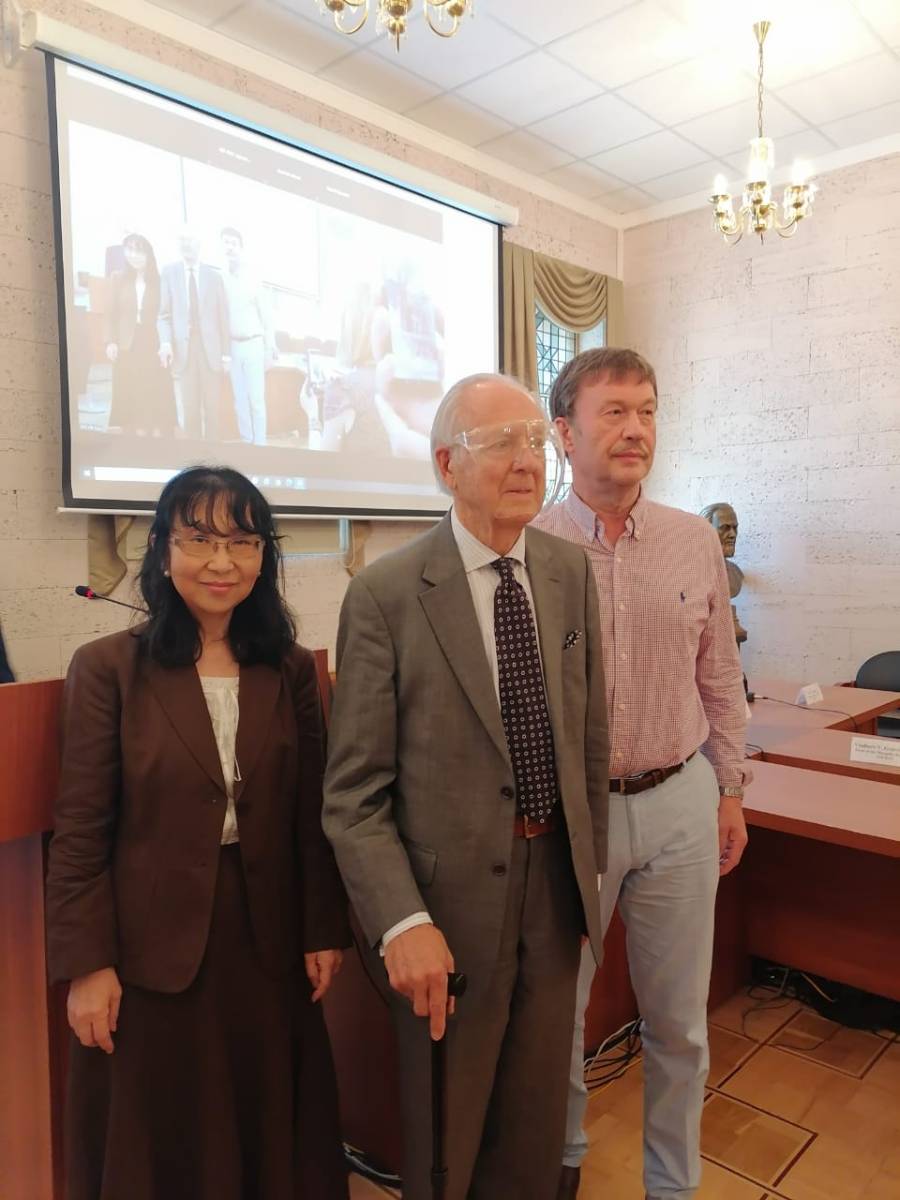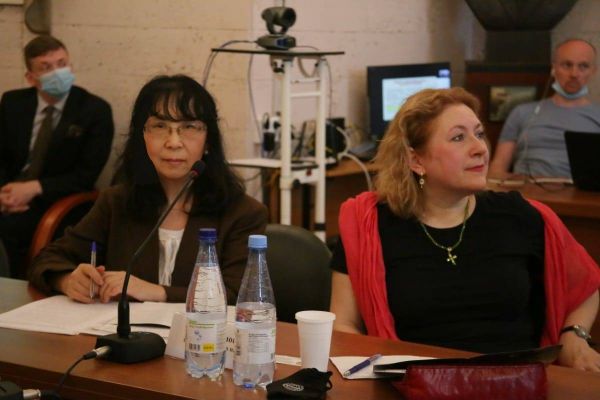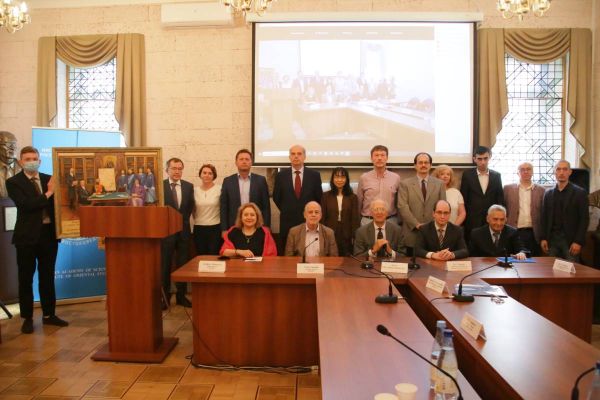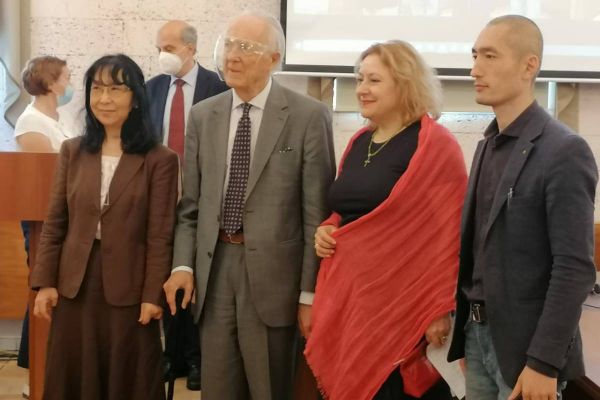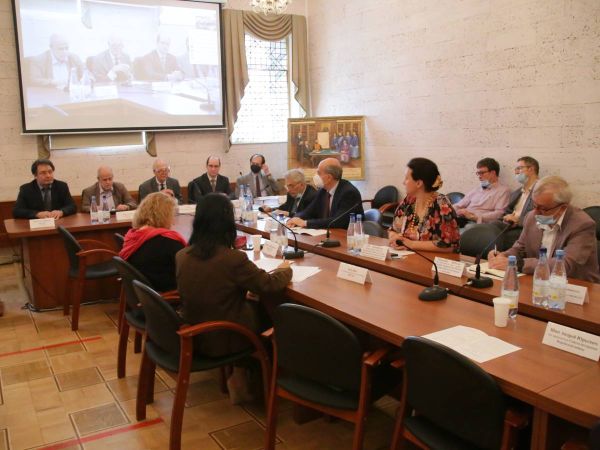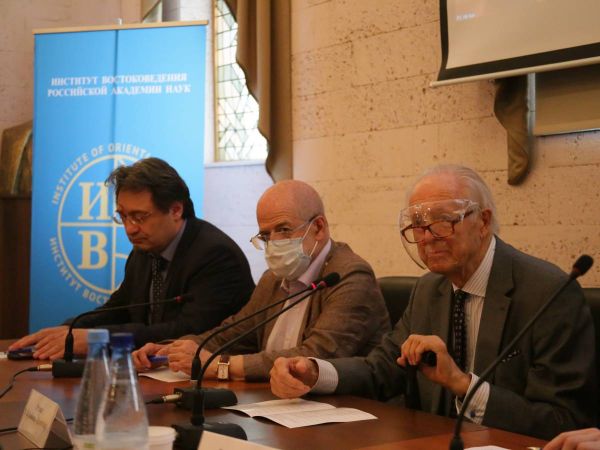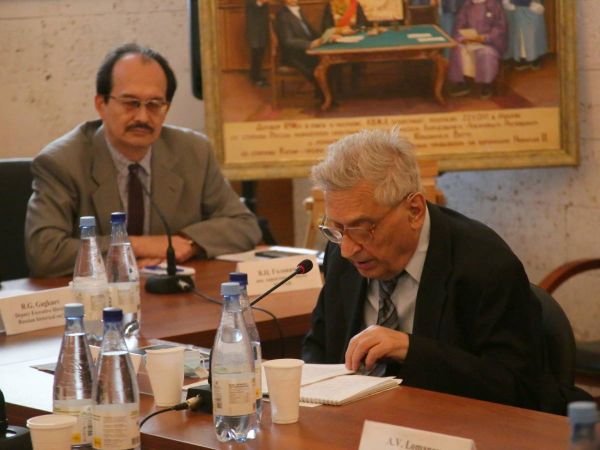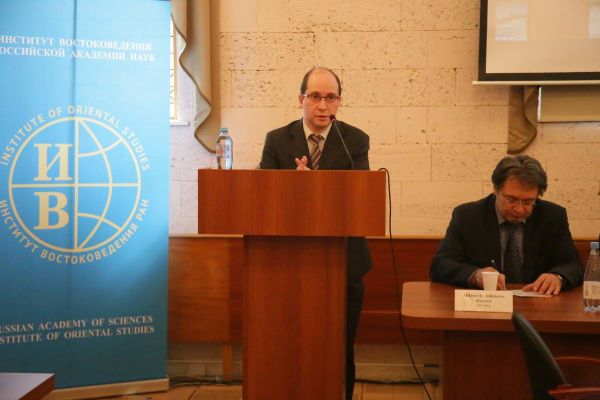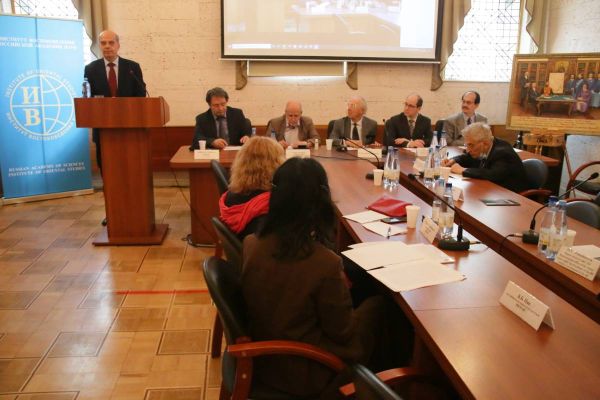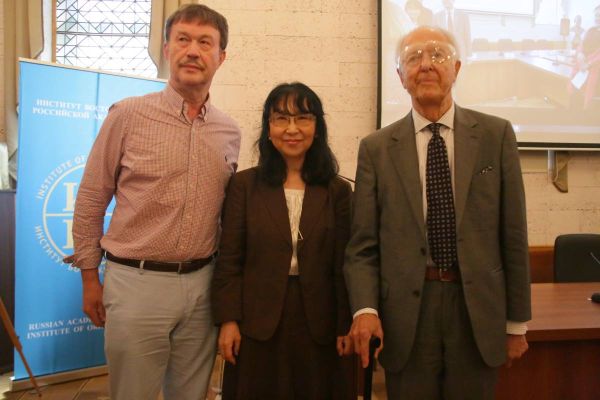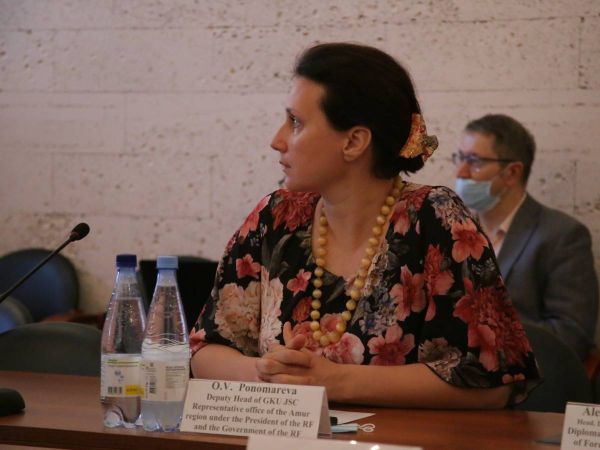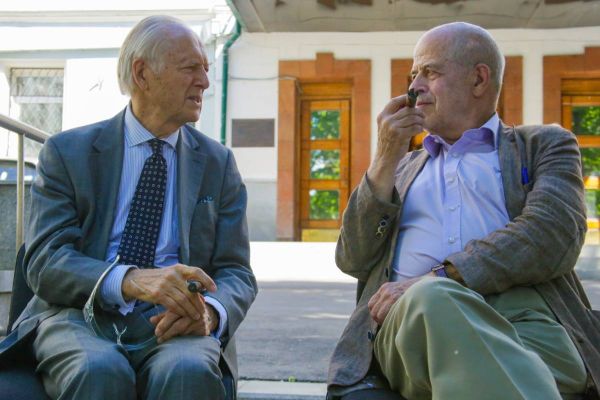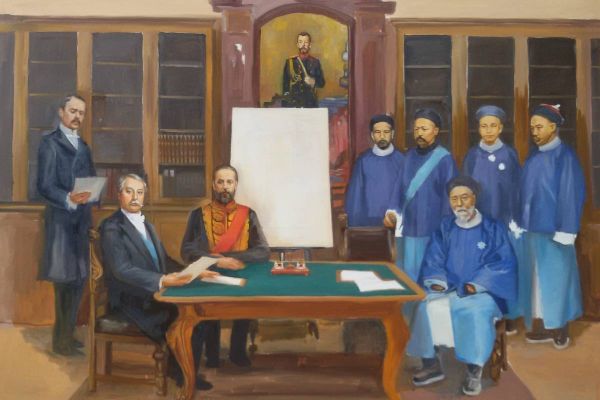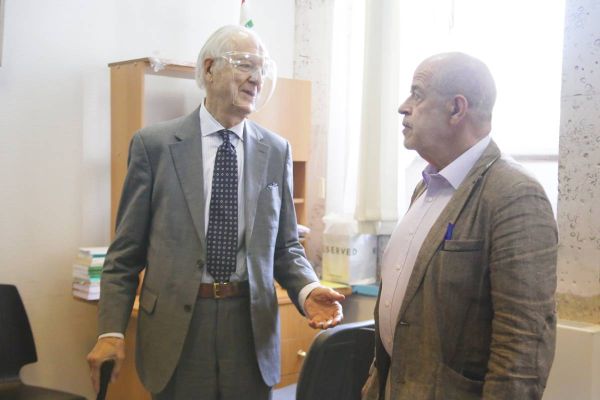News
Center News
16 июня 2021 года
International Scientific Conference "To the 125th Anniversary of the Russian-Chinese Allied Moscow Treaty of 1896: History and Modernity"
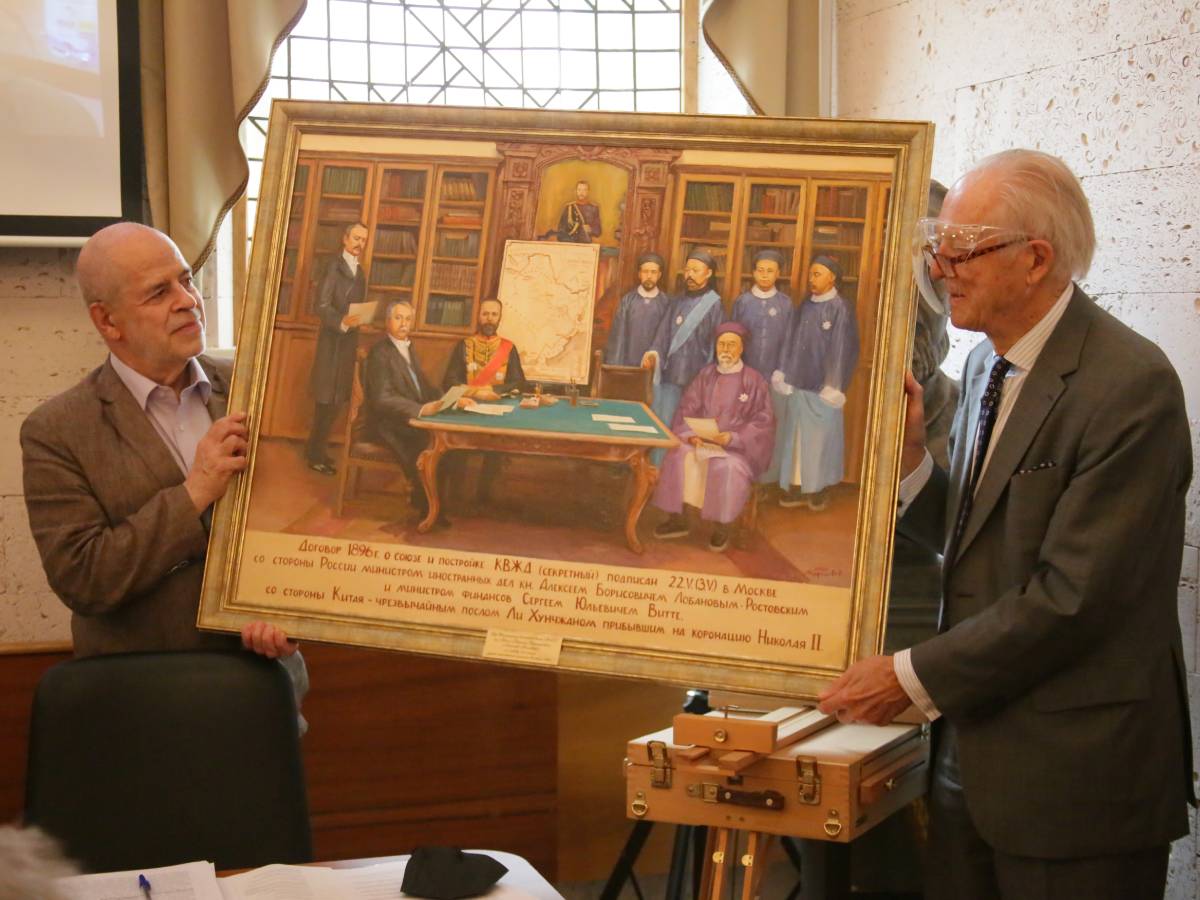
On June 16, 2021, the International Scientific Conference "To the 125th Anniversary of the Russian-Chinese Union Treaty of 1896: History and Modernity" was held at the Institute of Oriental Studies of the Russian Academy of Sciences
The purpose and objectives of the conference: analysis and evaluation of various aspects of the history of the conclusion of the treaty and its significance for relations between Russia and China, taking into account the historical background, current state and prospects of Russian-Chinese relations, comparing the views of the scientific community of Russia and China on historical events of the late XIX - early XX centuries in Northeast Asia.
The main directions of the conference:
- 125 years of the union treaty between Russia and China: history and modernity;
- Comprehensive strategic partnership: development factors, prospects;
- Trade and economic relations: history, problems, new projects;
- Cooperation in the humanitarian field (education, science, culture): achievements, problems, prospects.
The theme of the conference is relevant in the light of the need to strengthen humanitarian cooperation, deepen mutual understanding between the peoples of Russia and China, strengthen stability, security and good neighborliness in the region of Northeast Asia.
Conference participants: Academician Vitaly Vyacheslavovich Naumkin, Academician of the Institute of Oriental Studies of the Russian Academy of Sciences, Alikber Kalabekovich Alikberov, Director of the Institute of Oriental Studies of the Russian Academy of Sciences, Honorary member of the Presidium and co-founder of the International Council of Russian Compatriots Prince Nikita Dmitrievich Lobanov-Rostovsky, Deputy. Executive Director of the Russian Geographical Society Ilya Anatolyevich Gurov, Deputy Executive. Director of the Russian Historical Society Ruslan G. Gagkuev, Deputy. Olga Vyacheslavovna Ponomareva, head of the GKU JSC of the Representative Office of the Amur Region under the President of the Russian Federation and the Government of the Russian Federation, head. Research Center for the Culture of the Russian Emigration of China, Professor of Qiqihar University, Foreign Member of the Russian Academy of Sciences Li Yanling, Senior Researcher at the Foundation for the History of Northeast Asia Choi Dokkyu, Deputy. Director of IMEMO RAS, Professor Alexander Vladimirovich Lomanov, Deputy. director of the IV RAS for science Natalya Gennadievna Romanova, deputy. Valentin Tsunlievich Golovachev, Director of the Institute of Oriental Studies, Russian Academy of Sciences, Head of the HSE School of Oriental Studies, Professor Andrey Niyazovich Karneev, Head. Department of Oriental Languages of the Diplomatic Academy of the Ministry of Foreign Affairs of Russia Alexander Vladimirovich Semenov, Head. Sector of Mongolia of the Institute of Economics of the Russian Academy of Sciences Vladimir Viktorovich Graivoronsky, Head of the Group of Economics and Politics of Japan, IMEMO RAS Vitaly Grigorievich Shvydko, Head. Cabinet of Korean History and Culture of the Institute of Oriental Studies of the Russian Academy of Sciences Bella Borisovna Pak, Senior Researcher of the Institute of Oriental Studies of the Russian Academy of Sciences Larisa Petrovna Chernikova, President of the Charitable Foundation "Hope, Faith, Revival" Dering Marina Vladimirovna, Deputy. Chairman of the Council of Veterans of the Korean War Andrey Yuryevich Shin, President of the NGO "Descendants of the Fighters for the Independence of Korea" Alexander Olegovich Shorukov, Head of the Historical Section of the Russian Club in Harbin Sergey Yuryevich Eremin, Far Eastern researchers of Russian emigration in China A.A. Khisamutdinov, E.E. Aurilene, E.N. Chernolutskaya, deputy. Evgeny Vasilievich Verlin, editor-in-chief of the Russkiy Mir magazine, and others.
Academician Vitaly Vyacheslavovich Naumkin, Scientific Director of the Institute of Oriental Studies of the Russian Academy of Sciences, chaired the Organizing Committee and moderated the solemn part of the conference. Director for Research at the Institute of Oriental Studies of the Russian Academy of Sciences V.Ts. Golovachev, co-chairman of the organizing committee of the conference was the head. The Cabinet of Korean History and Culture of the Institute of Oriental Studies RAS B.B. Pack.
At the opening of the conference, Academician of the Russian Academy of Sciences, Scientific Director of the Institute of Oriental Studies of the Russian Academy of Sciences Vitaly V. Naumkin. He emphasized the importance of the first conference dedicated to the Russian-Chinese union treaty of 1896 in connection with the 125th anniversary of its signing, with the participation of leading Russian specialists in Russian-Chinese relations for this period. Vitaly Vyacheslavovich especially noted the significance of the presence at the conference of the descendant of the Minister of Foreign Affairs of the Russian Empire, the author of the treaty, Prince N.D. Lobanov-Rostovsky, an outstanding public figure who did a lot for the prestige of Russia, our relations abroad, symbolizing the continuity of generations and national reconciliation.
In his speech, Vitaly Vyacheslavovich pointed out the significance of the treaty in the history of Russia and China and the existing debates around it, the ambiguous assessments of Russian experts, and some of our Chinese partners related to its perception, to what extent the treaty should be considered equal or not quite equal in rights, and in In connection with this, he named the main goal of the conference - to find out the opinions, assessments of historians, orientalists, so that we could understand what is happening in this discourse and what role and place this treaty will take, which remains the cornerstone, as the first allied treaty, in the history of Russian-Chinese relations. In conclusion, Vitaly Vyacheslavovich pointed out special ties with the family of Nikita Dmitrievich of the Institute of Oriental Studies of the Russian Academy of Sciences, located next to the Nativity Monastery, in which the family burial vault of the Lobanov-Rostovsky princes is located.
Director of the Institute Alikber K. Alikberov. In his speech, he touched upon a wide range of issues, noting the importance of the treaty. Despite various assessments, he drew parallels with today. Referring to the existing coincidence of interests in the field of maintaining allied relations between Russia and China, the development of our countries and relations between us, citing as an example the construction of the Chinese Eastern Railway in the interests of both peoples, Alikber Kalabekovich also named the difference in the current situation, which consists in the fact that if earlier The Russian Empire created infrastructure on Chinese territory, but today China is developing infrastructure on the territory of the former Russian Empire, under the control of Chinese employees. He stressed that the current situation is forcing Russia and China to return to the format of interaction that was somehow laid down by the allied treaty between the Russian Empire and China.
Honorary member of the Presidium and co-founder of the International Council of Russian Compatriots Prince Nikita Dmitrievich Lobanov-Rostovsky
Honorary member of the Presidium and co-founder of the International Council of Russian Compatriots, Prince Nikita Dmitrievich Lobanov-Rostovsky, in his welcoming speech, noted that despite the imbalance of the treaty concluded during the period of the power of the Russian Empire and the decline of Qing China, both sides needed it: China needed protection against Japan , Russia needed a concession for the construction of the CER - the final link of the Trans-Siberian Railway in order to open a direct connection between European Russia and Vladivostok as soon as possible. In addition, the Chinese Eastern Railway created a lot of jobs for Chinese workers, who, after the completion of the road, joined the army of Mao Zedong. Nikita Dmitrievich pointed to the high assessment of Lobanov by the current head of the Russian Foreign Ministry S. Lavrov as "the most successful foreign minister of the Russian Empire", because "Lobanov offered only projects that could be implemented."
Further, according to the protocol, the solemn presentation by the Prince Nikita D. Lobanov-Rostovsky as a gift to the Institute of Oriental Studies of the Russian Academy of Sciences of a painting depicting the signing of the Russian-Chinese union treaty of 1896.
Ruslan G. Gagkuev, deputy performer. Director of the Russian Historical Society in his welcoming speech emphasized that the history of Russian-Chinese relations is one of the priority topics for RIO and the Fatherland History Foundation. He pointed out that in the light of the circumstances of the conclusion of the Russian-Chinese alliance treaty of 1896 and the difficult geopolitical situation for China as a result of the Japanese-Chinese war of 1894-1895, when Russia, together with France and Germany, forced Japan to abandon the seizure of part of Chinese territory, the union treaty signed by China in 1896 in Moscow differs to a large extent from other agreements concluded by Beijing during the 19th and early 20th centuries, and which are now called unequal treaties in Chinese historiography. R.G. Gagkuev stressed that the treaty was aimed at containing Japan, the British Empire, and partly the United States, providing security from a potential Japanese invasion in the absence of its own armed forces, which was clearly in the interests of China. Economic assistance to China was also important. Today, 125 years later, the CER built by Russia and the cities founded during its construction, which remained with China, can be called one of the main results of this agreement, which gave an example of large-scale and mutually beneficial cooperation between the two countries.
Deputy Head of the Representative Office of the Amur Region in Moscow Olga V. Ponomareva in her welcoming address, wished successful work, noting the significant contribution of the conference to the development of international relations and active cooperation between the Government of the Amur Region and the Institute of Oriental Studies of the Russian Academy of Sciences. She drew attention to the fact that the geographical location of the Amur Region and the longest border with China of all Russian regions obliges to be at the epicenter of Russian-Chinese relations, pointed to the active development of economic, social, cultural and political ties and good neighborly relations between neighboring regions of the Russian Federation and China.
At the conference, experts discussed a wide range of issues related to the history of the signing of the union treaty of 1896 and contemporary relations between Russia and China; trade and economic relations between China and Russia, Japan, Mongolia.
In his report, Valentin Ts. Golovachev, Deputy Director of the Institute of Oriental Studies of the Russian Academy of Sciences considered it appropriate to recall the Russian view on the essence and significance of the agreements on a military alliance and the CER, and also for the role of Li Hongzhang, paying special attention to his mission in Russia. After analyzing dozens of reports from the Russian envoy to China, A.P. Cassini to Foreign Minister A.B. Lobanov-Rostovsky, stored in the AVPRI, the author comes to the conclusion that the main task of Russia was to strengthen security and the economic development of the Far East by Russia, which required the strengthening of friendly relations and the conclusion of an alliance with China. The report cites original Qing documents indicating the strong interest of the Chinese side in the construction of the Chinese Eastern Railway and the linking of the Siberian Railway with the Chinese roads, which was directly related to the rapid economic development of Manchuria and potential protection from the growing claims of Japan. According to the author of the report, the road met the interests of both neighboring peoples, so the negotiations were successfully continued in Russia. The expert expressed the opinion that Li Hongzhang could not conclude and sign a secret agreement with Russia on the construction of the Chinese Eastern Railway without the knowledge of the Qing government. All his actions were coordinated with the Qing court. Also, Valentin Tsunlievich emphasized that the Russian-Chinese Treaty of 1896 was not unequal. It did not establish any special privileges for Russia and did not infringe on the sovereignty of China. But soon after the October Revolution, this agreement was annulled, among other secret agreements between tsarist Russia and the countries of the East.
One of the ten outstanding figures in the humanitarian exchange between China and Russia, winner of the Outstanding Contribution Award for teaching the Russian language in China, a leading scholar in the study of the literature of Russian emigration in China, head. Li Yanling, Professor of the Qiqihar University, Foreign Member of the Russian Academy of Sciences, presented a whole range of views of Chinese historians on the Chinese Eastern Railway in his most interesting report. Thanks to the report of Professor Li Yanling, the participants learned that the majority of Chinese scientists, despite the existing point of view that "the CER is a product of the struggle against Japan for the implementation of colonial domination over the Northeast of China", recognizes in the case of the CER the coincidence of the interests of the tsarist Russia and the Qing Dynasty, the benefit of it to both countries, and the joint nature of this enterprise. Professor Li Yanling is a supporter of the latter point of view, arguing for the construction of the CER and Harbin by Russia and China jointly, emphasizing that thanks to the CER, the Northeast turned into a frontier in China, which then became the industrial base of the new China in its early days. . The participants were especially interested in the theses that the Chinese Eastern Railway was the basis for the birth of the working class, the emergence of the workers' and communist movement in the northeast of China, an important tool for the creation of the CPC and the Chinese revolution.
In the paper, Deputy Director for Research at IMEMO RAS Anatoly V. Lomanov, prepared while studying the works of Chinese researchers of diplomacy at the end of the 19th century, the Chinese historical view on the problem of an alliance with Russia was analyzed.
Referring to the history of the Moscow Treaty of 1896, A.V. Lomanov emphasized that it demonstrates how deep and strong the ties between our countries are. Based on the publications of Chinese scientists, the report analyzes the approaches of the expert community to the development of relations between Russia and China, for which the treaty is the embodiment of one of the many attempts of the Qing Dynasty to “control barbarians with the help of barbarians”. The author of the report noted that some Chinese authors admit that the idea itself was not bad and brought success in the Republican period in the 1910-30s as part of the course to "keep Japan and Russia in alliance with the United States." In general, in China, according to the observations of A.V. Lomanov, they tend to classify all the agreements of the 19th century with tsarist Russia as “unequal”, but for the Moscow Treaty, some scientists make an exception, emphasizing that the agreement itself was equal and beneficial for Beijing . The advent of a “new era” in relations between our countries in the context of the inevitability of long-term rivalry with the United States means that the central theme of the Moscow Treaty, the union of Russia and China, not only has not gone into the past, but has gained unprecedented relevance today. In conclusion, Alexander Vladimirovich noted the importance of preserving the "great oriental studies", without which "there would be no great diplomacy." which was so vividly demonstrated at the end of the 19th century when this treaty was signed.
Head of the Cabinet of Korean History and Culture of the Institute of Oriental Studies RAS Bella B. Pak’s paper was dedicated to the role of Prince Alexei B. Lobanov-Rostovsky in revising the results of the Japanese-Chinese war and signing the Russian-Chinese union treaty of 1896. The report examines the events that preceded the conclusion of the treaty, analyzes the circumstances of its conclusion, and assesses the diplomatic activities of Lobanov-Rostovsky. Based on previously unused archival documents with information about the life of Prince A.B. Lobanov-Rostovsky, the author came to the important conclusion that with his activities in Russia for the first time conceptually formalized the foreign policy program of Russian policy in the Far East. Until the crushing defeat of China in the Sino-Japanese war of 1894-1895. and the conclusion of the Shimonoseki Treaty, such a program was absent and was characterized as waiting. Much attention in the report was paid to the period when A.B. Lobanov-Rostovsky to the post of Minister of Foreign Affairs, when he was made necessary, in connection with the events that had taken place, to quickly make a decision for Russia in view of the defeat of China and the emergence of Japan on the mainland as the owner of one of the most important strategic points. According to B.B. Pak, thanks to his vast experience and outstanding abilities as a politician and diplomat, he was able to correctly assess the situation and formulate the most balanced foreign policy strategy for Russia's behavior in the Far East in the context of the Japanese-Chinese clash. The main merit of Lobanov, according to the author of the report, was that thanks to his firmness and perseverance, Japan was not allowed to dismember China and settle on the Liaodong Peninsula near Russian possessions. Russia, having preserved the integrity and inviolability of China, without a single shot or bloodshed, exclusively by diplomatic methods, drew China into the sphere of Russian political influence, significantly raising its moral prestige, and strengthening its position in the region.
The report of the senior researcher of the Foundation for the History of Northeast Asia, (Republic of Korea) Choi Dokkyu was devoted to the economic program of Witte and the choice of the final destination of the Chinese Eastern Railway. The report discusses Witte's plans for the railway introduction to the Korean Peninsula as the final point of the Siberian Railway and the creation of the Russian-Korean Bank for this purpose. The extension to Korea was supposed to serve for the entry of Siberian goods to the Asian market. These plans were updated after the negotiations between Witte and Li Hongzhang on an alliance treaty failed to resolve the issue of providing Russia with an ice-free port in the Yellow Sea from China. In this regard, Witte's attention was drawn to a note by engineer S. Tolmachev, who considered the most effective "connection of Vladivostok with one of the ports on the western coast of Korea, since only densely populated China will benefit from the CER." According to the author's observation, Witte's attitude towards the Russo-Korean Bank was closely connected with the problem of acquiring an ice-free port for the CER on the Liaodong or Korean Peninsula. However, after the occupation of Port Arthur, the issue of establishing the Russian-Korean Bank was postponed indefinitely.
The speech by Vitaly Shvydko, Head of the Japanese Economics and Politics Group, IMEMO RAS, on the topic "Japan's Policy towards China at the present stage: the difficult search for a balance" was devoted to the analysis of relations between Japan and China, dating back to the full normalization of interstate relations in the 1970s ; how Japan perceives economic growth and China's growing influence in the region. The prospects for expanding bilateral trade and economic ties with China, the degree of accessibility of its domestic market for Japanese producers of goods and services are assessed. It is noted that China has become Japan's largest trading partner and, at the same time, there are bilateral problems and new risks of a political and economic nature that the states of the region have to take into account. Among them are territorial claims, concern about Beijing's foreign policy ambitions. The main element of relations that provides them with a certain stability, in his opinion, is a large volume of trade and investment ties, and in the long term, Japan's interest in a noticeable improvement in the climate of Japan-China relations remains.
In his report "Mongolia - China: Comprehensive Strategic Partnership" V.V. Graivoronsky gives a comprehensive view of the Mongolian-Chinese relations developing on the basis of the Treaty of Friendly Relations and Cooperation between Mongolia and the PRC of 1994 and the Joint Declaration on the Development of a Comprehensive Strategic Partnership, signed during the state visit of Chinese President Xi Jinping to Mongolia in August 2014. The features and historical significance of this declaration, in the author's opinion, are that, firstly, it was for the first time drawn up in the form of a joint declaration, which emphasized its special significance, and secondly, it was signed at the highest level by the leaders of the two states and marked the beginning of a new stage in the history of bilateral relations at the level of a comprehensive strategic partnership, thirdly, Chinese President Xi Jinping, speaking in the State Great Khural (parliament) of Mongolia, openly addressed the leaders of the people of Mongolia with an invitation to “take their place in the Chinese train joint development”.
Much attention in the report is paid to trade and economic relations, in particular
In particular, it is shown that China retains its position as the leading trading partner in all the main indicators of Mongolia. The growth of investments in the economy of Mongolia is noted, their volumes are indicated by industry. They talk about new trends in relations in the Russia-Mongolia-China triangle - trilateral cooperation in a number of priority areas, including the creation of an economic corridor Russia-Mongolia-China, the construction of road and rail transport corridors, an increase in the volume of transit rail and road traffic, conjugation of national initiatives of the three countries - the creation of the Eurasian Economic Union (Russia), the Belt and Road project (China), the Steppe Road project (Mongolia), the construction of the Russia-Mongolia-China gas pipeline, etc. According to the author, Mongolian -Chinese relations are at the highest point of their development over the past 30 years. In 2010-2020 bilateral relations have been raised to the level of a comprehensive strategic partnership. China has been the No. 1 trading partner and No. 2 partner in terms of foreign investment in the Mongolian economy over the past 30 years. Bilateral relations are comprehensive, all-encompassing, multi-level, covering political, economic, cultural, humanitarian, environmental, defense and other spheres. At the same time, the author notes the continued growth of China's influence and dominance in Mongolia's foreign trade and economy, and an increase in credit debt. According to him, China currently occupies in the economy of Mongolia the place that earlier, more than 30 years ago, the Soviet Union occupied in the economy of the Mongolian People's Republic in the late 1980s. The imbalance in the trade and economic relations of Mongolia with Russia and China continues to grow in favor of China.
In his closing speech, Prince Nikita Dmitrievich Lobanov-Rostovsky outlined his impressions during the flight from Beijing to Moscow: “If you fly from Beijing to Moscow, the first ten minutes is to the border with Mongolia, then two hours over the semi-desert of Mongolia, and then - fly for four hours and 20 minutes over Siberia, where only forests, lakes and rivers are visible, and occasionally the lights of oil rigs. But when you fly at night, the Chinese side periodically glows with settlements, and there are almost none in Siberia. This is the most compelling geopolitical lesson."
At the end of the conference, the participants expressed their wishes:
- hold a conference annually;
- publish the papers presented at the conference.
- The conference attracted significant media attention:
- https://www.youtube.com/watch?v=JvumP0_KLug&t=3403s
- https://koreanradio.info/the-hope-faith-and-rebirth-foundation-took-part-in-the-international-scientific-conference-on-the-125th-anniversary-of-the-russian-chinese-union-treaty-of-moscow-in-1896-history-and-modernity/
- https://hohlev.ru/obshhestvo/lidiya-dovydenko-russkie-aristokraty-otchizne
- https://sobesednik.ru/obshchestvo/20210713-kitai-xocet-druzit-ili-imeet-vidy-na-vo
- https://republic.ru/posts/100839

